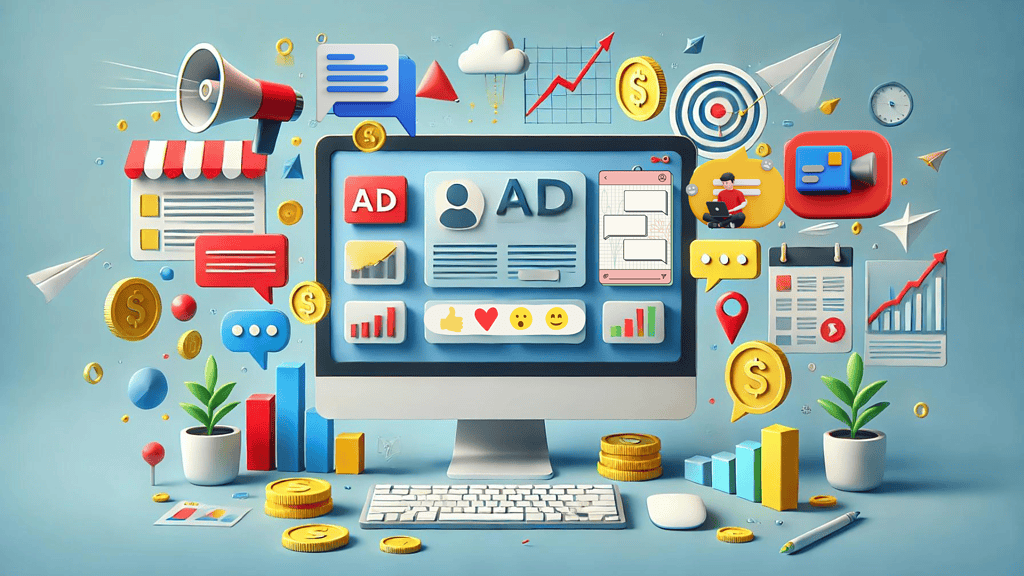The Future Of Programmatic Advertising: Trends And Predictions
Reading time: 7 minutes
Programmatic advertising has revolutionized the digital marketing world by automating the buying and placement of ads using advanced algorithms. As the landscape of technology continues to evolve, so too does programmatic advertising. In this article, we’ll explore the exciting future of programmatic advertising and its potential impact on small businesses. We’ll also delve into the benefits of digital marketing for small businesses, the role of analytics in digital marketing, and essential tools of marketing that will shape the future of advertising.
What is Programmatic Advertising?
Programmatic advertising refers to the automated process of buying and selling digital ads in real-time using algorithms. This technology has drastically changed how advertisers reach their audiences, enabling them to target consumers with precision and at scale. Programmatic advertising continues to grow, offering enhanced efficiency and cost-effectiveness compared to traditional ad-buying methods.

1. Increased Use of Artificial Intelligence (AI)
Artificial intelligence (AI) is set to become even more prominent in the future of programmatic advertising. AI-powered systems can analyze vast amounts of data, allowing advertisers to target their audiences more accurately and optimize ad spending in real time. This capability means advertisers can deliver more personalized ad experiences based on user behavior, preferences, and browsing patterns.
AI will also play a vital role in predictive analytics, helping advertisers forecast trends and consumer actions. This aligns with the broader use of analytics in digital marketing, where advertisers rely on data to make informed decisions. By leveraging AI, small businesses can take advantage of advertising analytics to refine their campaigns and maximize their return on investment (ROI).

2. Greater Emphasis on Privacy
With the implementation of stricter global data privacy regulations such as the General Data Protection Regulation (GDPR) in Europe and the California Consumer Privacy Act (CCPA) in the U.S., privacy concerns have become a top priority in digital marketing. Future developments in programmatic advertising will likely focus on enhancing privacy measures, moving away from personal data-based targeting to contextual targeting.
Contextual targeting ensures that ads are placed based on the content of a webpage rather than user data, providing a more privacy-compliant advertising solution. This approach can still be highly effective, especially when combined with analytics in digital marketing, as businesses can understand user engagement patterns without compromising privacy.
For small businesses, this shift presents an opportunity to build trust with consumers by prioritizing ethical data use. Moreover, employing tools like HubSpot can help small businesses manage customer relationships in a way that aligns with modern privacy standards.

3. The Rise of Connected TV (CTV) Advertising
As consumers increasingly move away from traditional television to streaming platforms, Connected TV (CTV) advertising is becoming a crucial component of digital marketing strategies. Programmatic advertising will expand into CTV, allowing businesses to reach their audience on streaming services like Netflix, Hulu, and YouTube TV.
CTV offers advertisers an unprecedented level of targeting and measurement compared to traditional TV ads. By using advertising analytics, businesses can track the effectiveness of their CTV campaigns in real-time, adjusting strategies for better performance. For small businesses, CTV presents a cost-effective way to reach highly engaged audiences without the massive budgets typically associated with traditional TV advertising.
4. Blockchain Integration in Programmatic Advertising
Blockchain technology is gaining traction in digital marketing, and its integration into programmatic advertising is expected to bring significant improvements in transparency and security. One of the biggest challenges in digital advertising is ad fraud, where ads are shown to bots or fake accounts, wasting advertising budgets.
Blockchain can help combat ad fraud by verifying ad deliveries, ensuring that advertisers only pay for legitimate views. This increases trust between advertisers and platforms, leading to more effective ad spend management. For small businesses, using blockchain in conjunction with tools of marketing like HubSpot can help maintain integrity in their advertising efforts and ensure transparency in all transactions.

5. Voice and Visual Search Advertising
As technology advances, voice-activated devices and visual search are becoming more prevalent. The rise of smart speakers like Amazon Alexa and Google Assistant, along with visual search capabilities on platforms like Pinterest and Google Lens, offers new opportunities for advertisers. Programmatic advertising will likely expand into these areas, requiring businesses to develop strategies that leverage these tools.
For example, businesses can target users based on voice search queries, creating more natural and personalized ad experiences. Visual search allows users to find products by uploading images, creating a more engaging and convenient shopping experience. Both voice and visual search are prime examples of how tools of marketing are evolving to meet changing consumer behaviors.
By utilizing advertising analytics, businesses can track user interactions with voice and visual search ads, optimizing their campaigns for better results. This is particularly beneficial for small businesses, as it provides an avenue to stay competitive without large marketing budgets.
The Benefits of Digital Marketing for Small Businesses
Digital marketing, particularly programmatic advertising, offers numerous benefits for small businesses. It levels the playing field, allowing smaller companies to compete with larger brands through targeted campaigns, real-time optimization, and precise analytics. Here are some key benefits of digital marketing for small businesses:
- Cost-Effectiveness: Digital marketing is typically more affordable than traditional marketing methods. Small businesses can allocate smaller budgets to achieve significant results through programmatic advertising, SEO, and social media marketing.
- Targeted Advertising: With advertising analytics and tools of marketing, businesses can target specific audiences based on demographics, interests, and behaviors, maximizing the effectiveness of their campaigns.
- Measurable Results: One of the main benefits of digital marketing for small businesses is the ability to measure the performance of campaigns in real time. Analytics platforms like Google Analytics and HubSpot provide detailed insights into user engagement, helping businesses refine their strategies for better outcomes.
- Increased Engagement: Digital marketing fosters direct interaction between businesses and consumers, whether through social media, email campaigns, or programmatic ads. Engaging content encourages customer loyalty and boosts brand awareness.

Final Thoughts: Leveraging the Future of Programmatic Advertising
The future of programmatic advertising is full of potential, offering businesses greater efficiency, stronger privacy protections, and expanded opportunities across different media channels. For small businesses, embracing these trends and understanding the benefits of digital marketing for small businesses can significantly impact their success.
By leveraging advertising analytics, AI, CTV, blockchain, and new tools like voice and visual search, small businesses can take full advantage of programmatic advertising to reach their target audiences effectively. Moreover, using platforms like HubSpot will enable businesses to stay competitive, compliant with privacy regulations, and fully transparent in their marketing efforts.
As digital marketing continues to evolve, those who stay ahead of the curve and adopt new technologies will be well-positioned to thrive in an increasingly competitive landscape. Discover how Owltek Solutions can elevate your brand with their innovative digital marketing services, designed to drive growth and engagement in the digital age!

**This post contains affiliate links, meaning I may earn a small commission if you make a purchase through one of them. Rest assured, I only recommend products I truly love. Your support helps keep my creative business thriving — thank you!**

